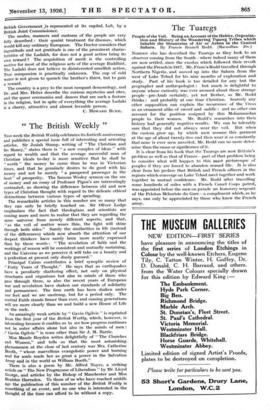" The British Weekly
Tins week the British Weekly celebrates its fortieth anniversary and publishes a special issue full of interesting and arresting articles. Sir Josiah Stamp, writing of " The Christian and his Money," states there is " a new complex of ideas " with regard to wealth and that the average successful man of Christian ideals to-day is more sensitive that he shall be " worth " the money he earns than he was in Victorian times, and that he genuinely desires to do good with his money and not be merely " a pampered passenger in the boat" of prosperity. The famous Wesley sermon on the use of money and an essay of Professor Pigou's are interestingly contrasted, as showing the difference between old and new types of Christian thought with regard to the delicate ethical distinctions between various types of spending.
The remarkable articles in this number are so many that they can only be briefly touched on. Sir Oliver Lodge emphasizes the fact that theologians and scientists are coming more and more to realize that they are regarding the same universe from merely different aspects, and that, " as the veil of matter wears thin, the light will shine through both sides." Surely the similarities in life (instead of the differences) which now absorb the attention of our deepest thinkers have rarely been more neatly expressed than by these words : " The revelation of faith and the workings of reason will be consistent and mutually sustaining, and the Universe as we perceive it will take on a beauty and a perfection at present only dimly guessed."
Principal Cairns contributes a brief synoptic review of " Forty Years of Thought." He says that as earthquakes have a peculiarly shattering effect, not only on physical structures and organisms but also in minds of those who pass through them, so also the recent years of European war and revolution have shaken our standards of solidarity and permanence. The firm earth has been shaken under our feet and we are unstrung, but for a period only. The central Faith stands firmer than ever, and coming generations will see more clearly than we and build a new House of Life BB the rock.
An amazingly weak article by " Gavin Ogilvie " is reprinted from the first year of the British Weekly, which, however, is interesting because it enables us to see how progress continues not in outer affairs alone but also in the minds of men :
Gavin Ogilvie " is none other than Sir J. M. Barrie.
Miss Maude Royden writes delightfully of " The Churches and Women," and tells us that the most astonishing phenomenon at the close of last century was Mrs. Catherine Booth, " whose marvellous evangelistic power and burning zeal for souls made her as great a power in the Salvation Army and in the world as William Booth."
There is also a poem by Mr. Alfred Noyes, a striking article on " The New Programme of Liberalism " by Mr. Lloyd George, and articles by the Bishop of Manchester and Miss Beatrice Harraden. To those of us who have reached middle age the publication of this number of the British Weekly is something of an event, and no one who is interested in the thought of the time can afford to be without a copy.














































 Previous page
Previous page